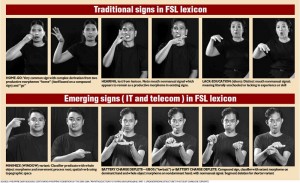Health workers train on sign language to be able to service deaf, mute better

The Department of Health-National Capital Region announced on Monday, Aug. 5, 2013, that it recently finished conducting the Filipino Sign Language (FSL) training among health promotion officers and coordinators in the capital.
MANILA, Philippines—Soon, deaf or mute patients in Metro Manila won’t have a hard time communicating with their healthcare providers.
The Department of Health-National Capital Region announced on Monday that it recently finished conducting the Filipino Sign Language (FSL) training among health promotion officers and coordinators in the capital.
They are in turn expected to train healthcare providers in their local government units, including personnel in local government hospitals, health centers and private clinics, according to DOH-NCR regional director Dr. Eduardo Janairo.
“These trainers will target healthcare providers in their local government units…they will be the one to train and educate these health workers for them to be able to understand the needs and concern of deaf patients,” said Janairo.
The DOH-NCR has already trained staffs of government health facilities and other specialty hospitals in the capital. So far, a total of 52 personnel have been certified as basic sign-language interpreters.
Article continues after this advertisementThe trainings began late in 2012 in Metro Manila. The FSL workshop will be extended later to hospital personnel in the provinces.
Article continues after this advertisementEarlier, Janairo explained that the FSL module include the sign language equivalents of numbers, the alphabet, greetings, time, medical terms, and questions frequently asked in emergency rooms.
It was developed in cooperation and support of the Philippine Deaf Resource Center, University of the Philippines-Philippine General Hospital, CAP College for the Deaf, De La Salle University-College of Saint Benilde and the Department of Education-National Capital Region.
DOH records showed 1,112 person with disabilities in Metro Manila. It counted 476 with hearing defects and 95 with speech impairment.
“We should understand that only through sign language can we fully understand the needs of deaf people [so] it essential that we in the health sector should know how to speak their language,” emphasized Janairo on Monday.
He added, “As healthcare providers, we should make our deaf patients feel and understand that their impairment is not an impediment to their growth and development because literacy can be taught in a manner that combines reading and sign.”